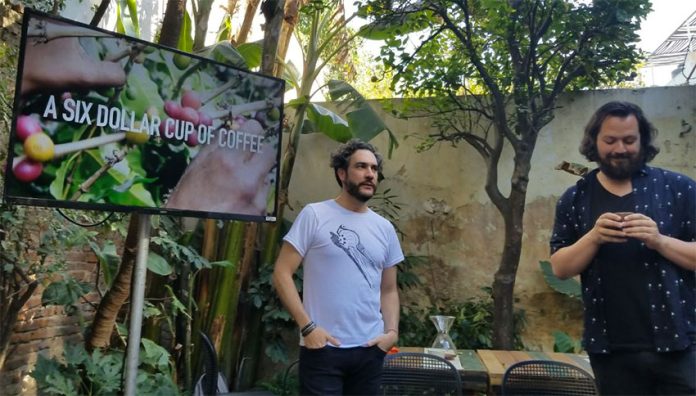The untold stories behind a cup of coffee are what directors Andrés Ibáñez Díaz and Alejandro Díaz tell in their new documentary A Six Dollar Cup of Coffee, which premiered in Mexican City last week after making the rounds in the international film festival circuit.
The film focuses on a Tzeltal family that works in a coffee cooperative in Chiapas and the trend of specialty coffee in Seattle, U.S., questioning the paradigms of quality in the coffee world.
“We opted for this type of documentary because we’re big-time coffee drinkers, we have up to five or six cups a day,” said co-director Ibáñez. “And although we like it a lot, we didn’t know from where it came or what it entailed.”
Alejandro Díaz assured viewers that A Six Dollar Cup of Coffee isn’t a documentary meant to make them feel bad for drinking their favorite pick-me-up.
“What we hope to do is to initiate a conversation. That coffee drinkers look at the product with instinctive eyes and check the label before consuming it, or that when they want a coffee, they analyze whether it’s good to go to the chain store or walk another block to buy it from their neighborhood cafe,” he said.
“You shouldn’t be shocked by a six-dollar cup of coffee,” says a person interviewed for the trailer for the film. “You should be shocked by a one-dollar cup of coffee. Because if a cup of coffee costs one dollar, and you truly know and understand the process and where that coffee came from, someone is getting screwed along the way.”
Ibáñez explained that coffee from Mexico to Ecuador is cultivated by indigenous people.
“We have no idea who is paying the producers, but it’s a chain of intermediaries that usually pays them very little,” he said.
Despite the market benefiting the farmers the least, the directors found them to be resilient, positive and self-affirming. Far from seeing themselves as victims, they saw themselves as enterprising producers of a quality product.
“The first thing we encountered [at the cooperative] was a syncretic Mayan/Catholic ceremony to celebrate the beginning of the coffee planting season, and we delved into the cosmogony,” said Ibáñez. “And their stories blew our minds.”
It took Ibáñez and Díaz five years to complete the documentary, which was shown at film festivals in Havana, Vancouver, Turkey, Spain, Germany and the Czech Republic, as well as in Querétaro and Guadalajara.
“We learned to be patient because the documentary moved at different rhythms from our own . . . We had to wait until the coffee was ready to be harvested . . . It was a long process, but it filled us with satisfaction,” said Díaz.
Source: La Jornada (sp)
